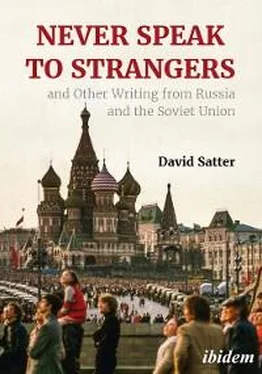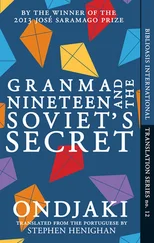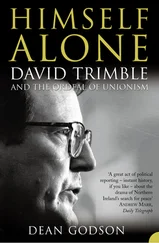I turned off on a side street and came upon the site of an old church which was surrounded by broken, weathered scaffolding except for the red bell tower and the golden cupola and cross. In a yard beside the church, an old man was filling pails with sand and I asked him if restoration work was continuing. He laughed disinterestedly without looking at me and said, “the State has more important objectives than restoring churches.”
The man continued his work, apparently unperturbed by being approached by a foreigner. “First they destroyed the churches now they’re restoring them,” he said. “I remember how they destroyed this one. They blew holes to the walls and burned the icons. Then they took out all the silver and gold. They said they needed the metal for industry.”
On our last day to town, we walked through the city gardens where mothers were pushing baby strollers and old men played chess on large outdoor boards. The intense sunlight filtering through the trees threw deep shadows on the sidewalks and the branches and leaves formed thick canopies over the winding dirt paths. We met a worker named Oleg from the telephone equipment factory and sat with him on a bench in an old, unpainted gazebo.
He said that Shadrinsk was a patriotic city which had supported the 1968 invasion of Czechoslovakia out of affection for the Czechs and the 1956 invasion of Hungary out of a desire to help the Hungarians. “Tell Carter that the Russians don’t want to fight,” he said. “We know how to fight but we don’t want to fight.”
Listening to Oleg, who was obvious in his interest in the outside world and his sincerity, it was easy to imagine the frightening potential of a dedicated army, with recruits drawn from places like Shadrinsk, marching into war full of confidence in the rightness of their cause but without the faintest actual idea what they were fighting for.
“I know we went into Afghanistan for purely humanitarian reasons, in order to help,” he said. “We’re Russians. If I had my last loaf of bread and you needed it, I’d cut it in half. I don’t care who you are, whether you’re English, American, Vietnamese, Israeli, we’re all people. We helped Cambodia, where how many million people died. It made your hair stand on end. We helped Vietnam. We are ready to help any country.”
I walked down some potholed side streets the following afternoon past a derelict church and emerged on the river bank to a scene of worldlessness and peace. Under feathered clouds in a blue sky, wizened old women watched from the steps of wooden houses as two policemen warned a young boy not to cut the branch off a tree.
There seemed little reason for life in Shadrinsk to be affected by events in a place as remote as Afghanistan and in the local newspapers, which were on sale in kiosks on the main street, it was easy to see how the conflict could have escaped people’s notice. In the twice-weekly Shadrinsk Rabochy and Zauralskaya Pravda , the daily regional paper, most of the news concerned the grain harvest or truancy among workers in the local factories.
In the evenings, we could pick up the Russian language service of the BBC and the Voice of America from my hotel room but on an issue like Afghanistan, the information broadcast by the BBC directly contradicts the information conveyed by the central Soviet television and Press. It may therefore indirectly reinforce official propaganda because to trust Western broadcasts, the resident of a provincial Russian city must make the unsettling assumption that much of what he is told about Afghanistan in the Soviet Press is a lie.
One afternoon we were joined at our table in a cafe near the central square by a muscular construction Worker who spoke to us about the world situation and became increasingly vehement as the conversation proceeded.
“The Americans are cunning people,” he said. “In how many countries do they have their bases? How many bases surround the whole Soviet Union.” The Russians were a peace-loving people. The Olympic boycott was an action against peace. He said that everyone supported the policy in Afghanistan and he added that no one had sent him over to talk to us, a possibility which crossed my mind while he was talking.
That night we met Oleg and a friend of his at the hotel restaurant. Oleg insisted on buying us several rounds of drinks and reminiscing about instances of East-West friendship, including the meeting of Allied and Russian forces on the Elbe. He recited a poem by Yevtushenko, “Do the Russians want War.” After delivering the full poem, he raised his voice to recite the last lines: “Russians don’t want war, Russians don’t want war, Russians don’t want war.”
Oleg’s friend, Vitya, offered a few final thoughts at our table on the situation in Afghanistan. I had asked him whether, he was troubled by Soviet Press claims that the Government of Afghanistan invited Soviet forces to help and the head of that government, Hafizullah Amin was immediately killed.
“There could have been two governments, one popular and the other anti-popular,” Vitya said reflectively. “We supported the popular government of Babrak Karmal. We don’t have all the information. We can’t see the peaks of policy. We see what is known to us but we know enough to take a view.”
Financial Times, Tuesday, August 5, 1980
How the Kremlin Kept Moscow Under Wraps
The 1980 Moscow Olympic Games were for long the focus of the most varied hopes and expectations. The games have now passed into history as an athletics success, but their impact on Soviet society has been strangely inconclusive.
To a limited extent, the games have improved the Soviet Union’s image. Athletes and foreign tourists have been impressed with the Olympic restaurants and hotels and the sports facilities, as well as the precision with which the transport to events was organised. But many in Moscow believed the games would mark a turning point towards either liberalisation or repression, a view made plausible by the years of careful preparation.
The opportunity to meet foreigners and be exposed to a different, freer way of life was one aspect of the Olympics which had most appealed to Moscow residents. The tight security thus gave rise to bitterness. People in Moscow began referring to the games as “our lipa,” diminutive for the woman’s name Olympiada which can also be translated as “sham” or “fake.”
To people in Moscow, the Olympics seemed remote. The foreign visitors, whose numbers were cut by the U.S.-led boycott by as much as three-quarters to around 75,000, were little seen by Russians, except in the windows of buses passing in convoy to Olympic events.
The opportunities for tourists to meet Russians were carefully controlled. Foreign visitors proved unadventurous, and tourist hotels were closed to all but registered guests and those with special passes.
Just before the Olympics began, the Soviet Komsomol, the communist youth organisation, opened 20 or so Western-style discotheques in the buildings of professional clubs around Moscow. The discotheques were intended to remedy one of Moscow’s longstanding shortcomings as a tourist attraction—the lack of street life or night clubs.
The discotheques offered Western rock music under strobe lights, and a relatively daring disco fashion show. Foreign tourists were brought to a club by their Soviet guides, ostensibly to show them Moscow’s hidden night life. In some cases, whole delegations were taken to the disco, where they were given the opportunity for political discussion or to dance with carefully vetted young Komsomols as well as plainclothes militia men and members of the KGB.
The number of Russians who might meet tourists was also restricted. The ban on travel to Moscow by non-residents and the successful efforts to persuade residents to take vacations during the Olympics, helped to reduce the number of people in Moscow by at least 1m.
Читать дальше












